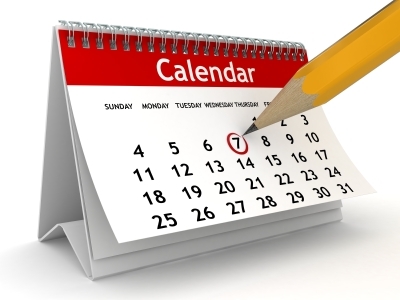 You’ve probably heard it from your doctor every time you’ve gone it for a checkup: “When was your last period?” And some of us have had to scour the backs of our minds trying to remember exactly what day our last period actually was, only to result in a lecture from the doc about how we should be tracking our period every, single month.
You’ve probably heard it from your doctor every time you’ve gone it for a checkup: “When was your last period?” And some of us have had to scour the backs of our minds trying to remember exactly what day our last period actually was, only to result in a lecture from the doc about how we should be tracking our period every, single month.
But what benefits does tracking our period actually have? Besides shaving off a few awkward seconds at our doctor appointment, what’s the point of tracking how long and how heavy a period is each month?
Today, I want to dive into some of the benefits of tracking a period and why we should all be getting into the habit of doing so.
You know WHEN you’re period is going to happen.
After tracking your period for a few months, whether using a calendar or an app, it opens up doors for predicting your period. Most apps will tell you a couple of days ahead of time that you’re period is due, and the apps do all the calculations for you to tell you what’s your normal start and end date.
That way if you’re like me and notorious for not carrying your feminine products with you daily, you at least have a heads up that it’s time to start preparing for your monthly friend. It’s also nice because if you have particularly painful periods, you can start preparing your body by taking ibuprofen a few days before your period begins (at least this is what my doctor has always recommended to me, and tracking my period lets me know when I should start taking my medications).
You know if late is normal.
I had a friend who always worried she was pregnant because in her mind, her period was ALWAYS coming late. Eventually she got sick of the pregnancy scares, and began to track her period. Turned out that her cycle was a little odd but completely regular. She would cycle between having her period about 26 days apart one month and the next month her cycle would be 35 days apart. And this was completely normal for her. It happened every time. She wouldn’t have known this if she hadn’t began to track her period.
Tracking makes it really easy to know what your normal cycle is because it’s different for everyone. Once you see it put on a graph or on a calendar, the world starts making a lot more sense.
You’ll know if something abnormal is happening.
Tracking your period gives you a lot of control over what’s happening to your body. You know when to be prepared for bleeding and you know what’s normal for you period.
Which also makes it really easy to detect when something ISN’T normal. So say you are having an especially long period this time, or your last period was especially short, you’ll be the first one to know if that’s normal or not. And that way, you can decide whether you need to see your doctor and you’ll be extremely informed when you sit down to have the conversation about your concerns.
For me, it’s been especially helpful to track my spotting between periods. As an avid runner, I tend to have spotting in between my periods. By tracking my spotting, I’ve been able to associate it with my PMS cycle and my runs. I’m a little more likely to spot right before PMS than I am during any other work outs. With that knowledge, I know when something out of the normal is happening.
Track your flow, pain, and your mood
Some people have really intense periods. They are sick, moody, and in a lot of pain. Sometimes this starts before the period, sometimes this is during, and for some it can even happen AFTER the period.
Thankfully, tracking your period lets you track all of these things. You can track how you’re feeling throughout your entire cycle. You can track your pain and how intense it is. And you can even track how heavy your flow is. It helps you determine once again what’s normal for you and why things are happening the way they are.
For example, flow is usually heavier for the first couple days of bleeding, but for some people it may vary. I’ve noticed that day 2 and 3 are particularly bad for me and I can therefore plan accordingly. I can also track my cramps, although in my time tracking my period, it hasn’t really helped me track down a real correlation between my cycle and my pain.
But that’s not the case for everyone. I have a friend who religiously tracks her period as well and was noticing that she was having a lot of stabbing pain when she wasn’t even close to her cycle. She later found out that the pain was totally normal and she was just experiencing pain in her ovaries when she was ovulating. She wouldn’t have known that without tracking her period!
You can also track your PMS (most apps will tell you when PMS is happening or about to start) so you can track if there are any trends in your moods. Do you get overly sad before your period? Overly angry? You can finally have real proof to blame your moods on your period!
You’ll know when you’re fertile
If you’re trying to get pregnant, a tracking app can be your best friend. They’ll let you know when you’re fertile and tell you the best time to get pregnant. Or if you’re trying to avoid getting pregnant, you can know when to stay away or when to be a little more cautious.
Of course, that’s just a brief overview of tracking your period. There are endless reasons you should be keeping in touch with what is happening to your body.
Tracking your period is all about becoming one with yourself and creating a personal relationship and understanding with your body and your cycle. Just because we only menstruate 3 to 5 days of the month, that doesn’t mean our cycle is only happening for those days. Our cycle is a daily part of our lives so it is up to us to work to understand what is normal so we can quickly act when something isn’t normal. Tracking your cycle is the first step to helping establish that relationship.
And it’s easier than ever to track your period! Now you don’t have to do it all on your calendar by yourself. There are dozens upon dozens of apps out there that will help you to track your cycle! I plan to review some of them in the future on this blog, but in the meantime, check some out for yourself!
Do you track your period? What app do you use to do it? Let me know in the comments below!
Until next time,
Kat
 What was interesting about the conversation with my mother was when she told me that when she was my age she used to experience cold and flu symptoms every time she was on her period. I had never heard anything like that before. None of my friends had ever mentioned anything like this before when we talked about our periods, so it seemed very odd to me.
What was interesting about the conversation with my mother was when she told me that when she was my age she used to experience cold and flu symptoms every time she was on her period. I had never heard anything like that before. None of my friends had ever mentioned anything like this before when we talked about our periods, so it seemed very odd to me.
